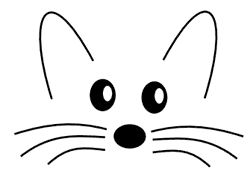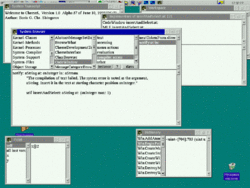Squeak: Difference between revisions
mNo edit summary |
mNo edit summary |
||
| Line 1: | Line 1: | ||
[[Image:Squeaklogo.png|right]] | [[Image:Squeaklogo.png|right]] | ||
Squeak is a multi platform open source [[Smalltalk]] environment originally released in 1996 by [[Apple]] and based on the older "Smalltalk-80 for the Macintosh" that was an unofficial Apple product from 1985 onwards. The original Apple implementation was a little backward because it was based on Smalltalk-80 Release one that Apple had got a free redistribution licence for alongside a few other companies, later version however required a hefty licence fee from MIT and the company decided to stick with the outdated R1 language rather than cough up the licence fee. | Squeak is a multi platform open source [[Smalltalk]] environment originally released in 1996 by [[Apple]] and based on the older "Smalltalk-80 for the Macintosh" that was an unofficial Apple product from 1985 onwards. The original Apple implementation was a little backward because it was based on Smalltalk-80 Release one that Apple had got a free redistribution licence for alongside a few other companies, later version however required a hefty licence fee from MIT and the company decided to stick with the outdated R1 language rather than cough up the licence fee. When Squeak was released as an open source software in 1995 it had an updated GUI but archaic language features. | ||
There exists three different ports of Squeak for OS/2: | There exists three different ports of Squeak for OS/2: | ||
| Line 7: | Line 7: | ||
* A [[DIVE]] based port by [[Juan Manuel Vuletich]] | * A [[DIVE]] based port by [[Juan Manuel Vuletich]] | ||
: This port solves the problem of the display environment by using [[DIVE]], the game oriented display API from IBM, quite innovative and if you have a hardware accelerated DIVE on your machine the port is actually faster than the original Mac and [[MS Windows]] versions. | : This port solves the problem of the display environment by using [[DIVE]], the game oriented display API from IBM, quite innovative and if you have a hardware accelerated DIVE on your machine the port is actually faster than the original Mac and [[MS Windows]] versions. | ||
* '''Cheese''' - A native [[PM]] port by | * '''Cheese''' - A native [[PM]] port by Boris G. Chr. Shingarov | ||
: A version of Squeak that uses [[Presentation Manager]] windows and widgets instead of the BitBlt virtual environment and resembles a simplified [[VisualAge Smalltalk]] as much as it does a traditional Smalltalk environment or Squeak. | : A version of Squeak that uses [[Presentation Manager]] windows and widgets instead of the BitBlt virtual environment and resembles a simplified [[VisualAge Smalltalk]] as much as it does a traditional Smalltalk environment or Squeak. | ||
Of the three the DIVE based port and Cheese are by far the most interesting, the dive based port imitates the original BitBlt Apple environment exactly by using DIVE which is quite an innovative approach that works well, it even interpolates the available colours to allow you to display a larger colour | Of the three the DIVE based port and Cheese are by far the most interesting, the dive based port imitates the original BitBlt Apple environment exactly by using DIVE which is quite an innovative approach that works well, it even interpolates the available colours to allow you to display a larger colour palette than you are actually using, useful if your version of DIVE shows a noticeable slowdown with larger colour palettes. Early versions lacked support for sound and networking but that had been remedied by version 3, however even the last version 3.5 still does not have support for MIDI, serial port or joysticks, but this is a non issue in 99.9% of cases. | ||
Cheese is even less complete than the DIVE port but presents a much nicer programming environment in many cases as you are no longer bound by the limitations of the BitBlt workbench and can move windows around any way you like. Interestingly, like [[BISS-AWT]] influenced Swing on Java, Cheese actually had an influence on the SWT Java widgets toolkit as Mr Shingarov later went to work on SWT and cites his work on Cheese as an influence on how SWT was implemented. | Cheese is even less complete than the DIVE port but presents a much nicer programming environment in many cases as you are no longer bound by the limitations of the BitBlt workbench and can move windows around any way you like. Interestingly, like [[BISS-AWT]] influenced Swing on Java, Cheese actually had an influence on the SWT Java widgets toolkit as Mr Shingarov later went to work on SWT and cites his work on Cheese as an influence on how SWT was implemented. | ||
| Line 27: | Line 27: | ||
;DIVE Squeak port | ;DIVE Squeak port | ||
* Long filename support (install Squeak on a HPFS or network drive) | * Long filename support (install Squeak on a HPFS or network drive) | ||
* DIVE video | * DIVE video DLLs (Installed by default by OS/2 Warp 4 Multimedia Support, but can be added to any OS/2) | ||
* DART audio | * DART audio DLLs (Installed when installing an audio card, but can be added even without one) | ||
* Video mode with at least 256 | * Video mode with at least 256 colours, and support for DIVE (any driver should work) | ||
;UNIX Squeak port | ;UNIX Squeak port | ||
Revision as of 14:08, 23 May 2018

Squeak is a multi platform open source Smalltalk environment originally released in 1996 by Apple and based on the older "Smalltalk-80 for the Macintosh" that was an unofficial Apple product from 1985 onwards. The original Apple implementation was a little backward because it was based on Smalltalk-80 Release one that Apple had got a free redistribution licence for alongside a few other companies, later version however required a hefty licence fee from MIT and the company decided to stick with the outdated R1 language rather than cough up the licence fee. When Squeak was released as an open source software in 1995 it had an updated GUI but archaic language features.
There exists three different ports of Squeak for OS/2:
- Original Squeak port by Boris G. Chr. Shingarov
- This is basically UNIX Squeak quickly ported to OS/2, as a text mode application it works correctly on OS/2, but for the graphics environment you will need an X11 server (although it will obviously work with a PM based X11 server if as well).
- A DIVE based port by Juan Manuel Vuletich
- This port solves the problem of the display environment by using DIVE, the game oriented display API from IBM, quite innovative and if you have a hardware accelerated DIVE on your machine the port is actually faster than the original Mac and MS Windows versions.
- Cheese - A native PM port by Boris G. Chr. Shingarov
- A version of Squeak that uses Presentation Manager windows and widgets instead of the BitBlt virtual environment and resembles a simplified VisualAge Smalltalk as much as it does a traditional Smalltalk environment or Squeak.
Of the three the DIVE based port and Cheese are by far the most interesting, the dive based port imitates the original BitBlt Apple environment exactly by using DIVE which is quite an innovative approach that works well, it even interpolates the available colours to allow you to display a larger colour palette than you are actually using, useful if your version of DIVE shows a noticeable slowdown with larger colour palettes. Early versions lacked support for sound and networking but that had been remedied by version 3, however even the last version 3.5 still does not have support for MIDI, serial port or joysticks, but this is a non issue in 99.9% of cases.
Cheese is even less complete than the DIVE port but presents a much nicer programming environment in many cases as you are no longer bound by the limitations of the BitBlt workbench and can move windows around any way you like. Interestingly, like BISS-AWT influenced Swing on Java, Cheese actually had an influence on the SWT Java widgets toolkit as Mr Shingarov later went to work on SWT and cites his work on Cheese as an influence on how SWT was implemented.
- SqueakJS - An interpreter that allows you to run Squeak Smalltalk inside a browser - Open source - Current.
Versions

- Latest DIVE Version: 3.5 (2003/06/05) Hobbes
- Latest Cheese version: Cheese5
- Last known UNIX port: 1.3
- Last known DOS version: 2.0 (Squeak 2.1)
Prerequisites
- DIVE Squeak port
- Long filename support (install Squeak on a HPFS or network drive)
- DIVE video DLLs (Installed by default by OS/2 Warp 4 Multimedia Support, but can be added to any OS/2)
- DART audio DLLs (Installed when installing an audio card, but can be added even without one)
- Video mode with at least 256 colours, and support for DIVE (any driver should work)
- UNIX Squeak port
- Any X11 server
Links
- OS/2 Port web site [1]
- Squeak WebSite [2]
- Embedded Squeak 1.0 (Squeak 2.2) - For Win9x console, can be easily ported to DOS or OS/2 command line.
- Squeak Swiki
- Planet Squeak - News and links
- SqueakLand - Etoys, tutorials for non-programmers etc.
- Pharo - A fork of Squeak, no OS/2 version so far.
- CUIS - Another fork of Squeak, with emphasis on smaller more coherent system, no OS/2 version yet.
Publications

Ca. 1998
- Squeak by Example - Third edition - 2010 - Available as a downloadable PDF format file or as a softcover book, in French and Korean in addition to English. Written by Andrew P. Black, Stéphane Ducasse, Oscar Nierstrasz, Damien Pollet, Damien Cassou and Marcus Denker.
- Source code from the book can be downloaded from here.
- Stephane Ducasse: Squeak: Learn Programming with Robots - 2006, ISBN 1590594916
- Gene Korienek; Tom Wrensch; Doug Dechow: Squeak: A Quick Trip to ObjectLand – 2001, ISBN 0-201-73114-2
- Mark J. Guzdial; Kimberly M. Rose: Squeak: Open Personal Computing and Multimedia – 2001, ISBN 0-13-028091-7
- Mark J. Guzdial: Squeak: Object-Oriented Design with Multimedia Applications - 2000
Related Articles
- Terse Squeak - All the Squeak keywords and options in one terse file.
License
- Open Source - MIT License and Apache Software License v2
Authors
- Apple Corp (Original author)
- Disney (Current maintainer)
- Alan Kay (Original author)
- Dan Ingalls (Original author)
- Ted Kaehler (Original author)
- John Maloney (Original author)
- Scott Wallace (Original author)
- Juan Manuel Vuletich (OS/2 DIVE port).
- Boris G. Chr. Shingarov (OS/2 port and Cheese)